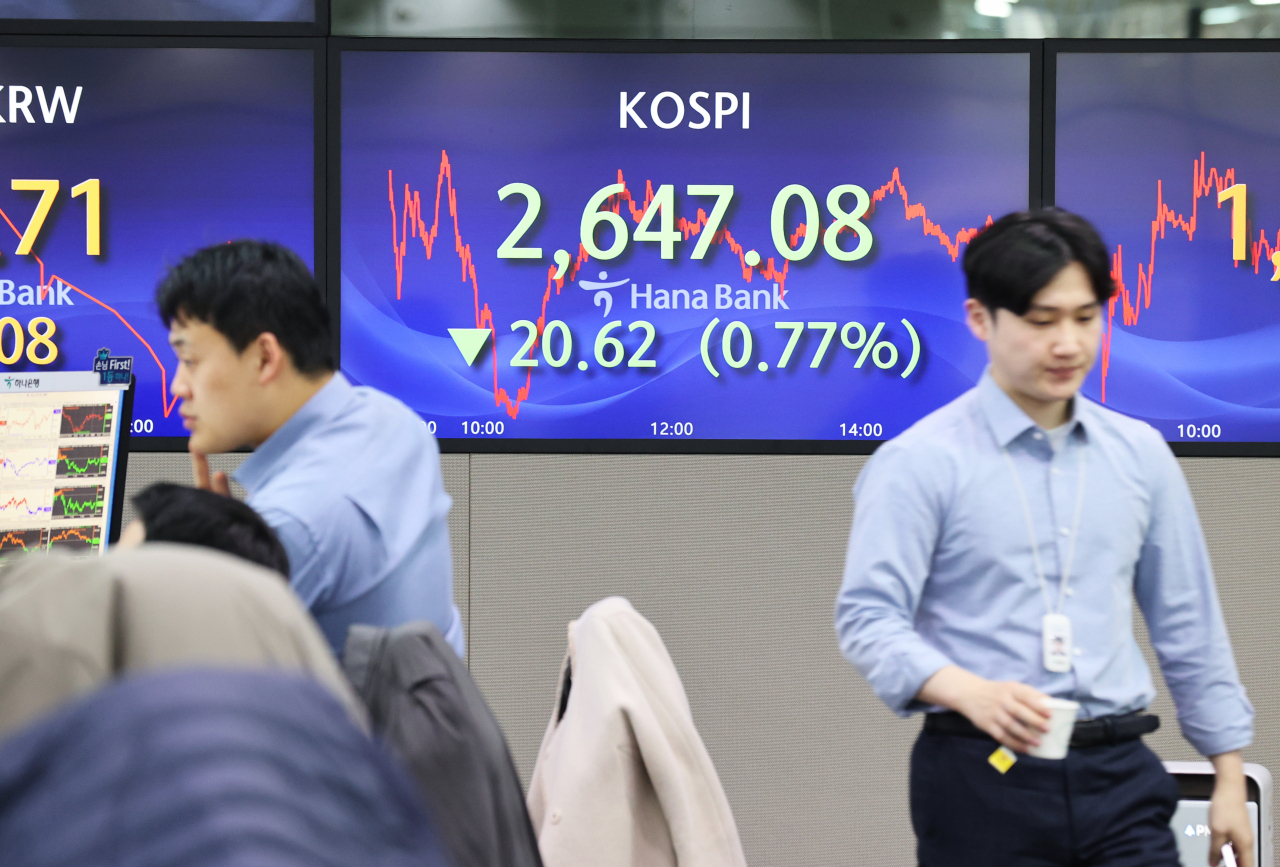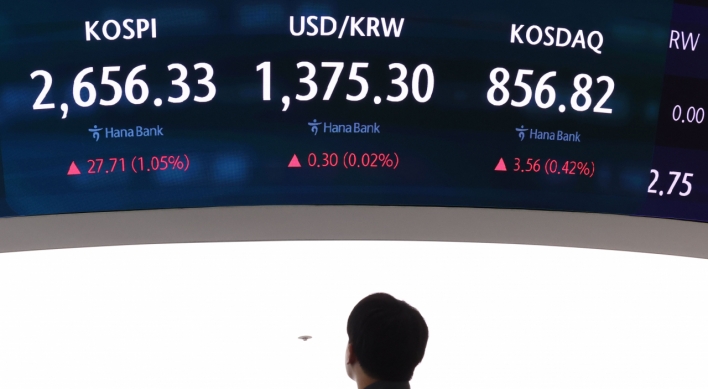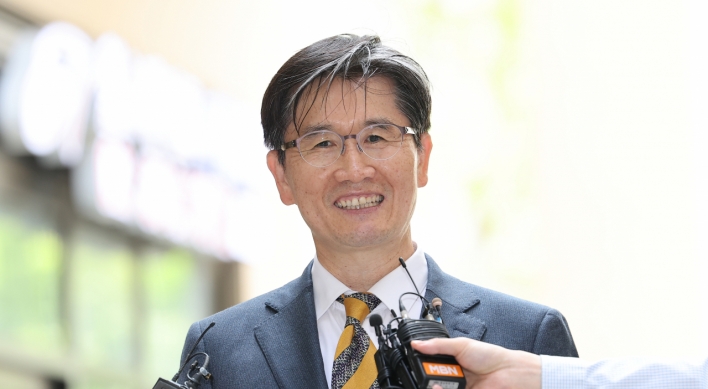[KH Explains] Will Yoon's 'value-up' drive end Korea discount?
By Im Eun-byelPublished : Feb. 26, 2024 - 17:45

South Korean authorities on Monday introduced a set of measures encouraging listed companies to boost their valuation as a part of efforts to shake off the so-called “Korea discount” which has been haunting the local capital market for decades.
Under the “corporate value-up program,” firms listed on the Korean stock market will be advised to disclose their plans to enhance corporate value and shareholder returns while releasing related financial metrics for better communication with the public.
What is the 'Korea discount'?
The "Korea discount" refers to the tendency of South Korean listed companies to have lower valuations than their peers in the global market.
According to the local regulator Financial Services Commission, the phenomenon stems from companies failing to efficiently utilize their assets, along with having insufficient levels of shareholder return and weak corporate governance from the dominance of conglomerates.
Korea’s stock market price-to-book value ratio, which shows how much firms are valued on the stock market compared to their book value, remained at 1.05 last year, meaning that the market appreciation for the companies is nearly shoulder-to-shoulder with their net asset value.
What is the ‘corporate value-up program’?
The program includes a preliminary guideline to encourage companies to elevate their value in a mid-to-long-term perspective.
The guideline mainly suggests that listed firms formulate and disclose a plan to enhance their corporate value. The companies can update the plan every year. English disclosures are strongly recommended.
Kospi-listed companies with over 500 billion won ($375 million) in market value as of 2024 will have to announce whether they have disclosed the value enhancement plan or not, along with sharing an update on the efforts to hold a dialogue with their shareholders. The mandate will be expanded out to all Kospi-listed companies from 2026.
To boost participation from companies, tax incentives will be offered for companies that comply with the measures. Further details to the guideline will be settled in June, while the official kick off is slated for the second half of this year.
Apart from the guidelines, Kospi- and Kosdaq-listed companies will have to regularly disclose their valuation metrics such as price-to-book ratio, price-earnings ratio and return on equity to provide transparent information for investors.
Institutional investors, including pension funds, will have to reflect listed companies’ efforts to enhance value in their stewardship code for investment as well.
Why duplicate Japan’s directive?
The drive to overcome the Korea discount comes amid the President Yoon Suk Yeol administration’s push for measures to boost the local stock market ahead of the general election slated for April, such as raising the threshold for major shareholders’ capital gains tax and abandoning the investor income tax plan.
Similar to the directive introduced by Korea on Monday, Japan has been adopting a “comply or explain” measure that directs listed "undervalued" companies to formulate reform plans to enhance their capital efficiency.
Joined with the Bank of Japan’s steadfast low interest rate policy, Japan’s Nikkei stock index has recently been breaking records nearly every day, surging to its highest levels since 1989.
Where to invest?
Share prices of major conglomerates' holdings companies -- notorious for being undervalued -- had soared after it was confirmed last month that related measures would be announced. Samsung's de facto holding company Samsung C&T and SK Inc., the holding firm of SK Group, saw a price surge.
Market heavyweights such as Hyundai Motor Group and Kia saw a boost in their share prices as investors deemed the stocks were undervalued from the sister automakers’ complex shareholding structure.
Banking shares were another group that enjoyed high expectations on improved shareholder returns. Financial firms in Korea are assessed to have undervalued stocks due to their ties with the local authorities.
Will Korea step out of devaluation?
With the measures being weaker than the market expectations, the local stock market, which had soared in recent weeks backed by hopes of a complete reform, inched down on Monday.
Benchmark Kospi closed at 2647.08 points, down 20.62 or 0.77 percentage points from the day before. Secondary bourse Kosdaq also wrapped up at 867.4, down 1.17 or 0.13 percentage points.
“Companies need stronger incentives and penalties, rather than just responding to (the guidelines) by declaring seemingly plausible goals and plans,” James Lim from Dalton Investment, a US-based long-term investment fund, said.
While the introduced directive adopts Japan's "name and shame" regime, Lim stressed it should have stronger requisites to bring changes from companies. The introduced measures are only basic protocols in corporate governance, he viewed.
Others view the directive to be a catalyst for reform which could attract an inflow of funds to the capital market, being an “onset of positive change.”
“A large part of assets owned by Korean households are encroached in the real estate market. If the measures are successfully implemented, the funds will flow into the capital market, strengthening the fundamentals of the Korean economy,” said Yi June-suh, a professor at Dongguk University.










![[Weekender] How DDP emerged as an icon of Seoul](http://res.heraldm.com/phpwas/restmb_idxmake.php?idx=644&simg=/content/image/2024/04/25/20240425050915_0.jpg&u=)

![[Today’s K-pop] NewJeans' single teasers release amid intrigue](http://res.heraldm.com/phpwas/restmb_idxmake.php?idx=644&simg=/content/image/2024/04/26/20240426050575_0.jpg&u=)






![[Herald Interview] Mistakes turn into blessings in street performance, director says](http://res.heraldm.com/phpwas/restmb_idxmake.php?idx=652&simg=/content/image/2024/04/28/20240428050150_0.jpg&u=)
